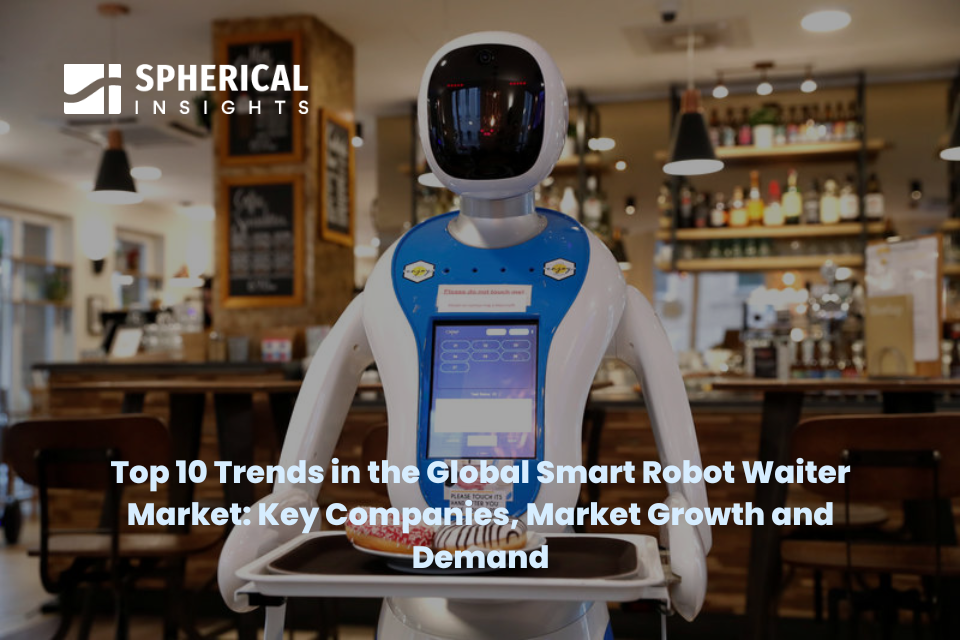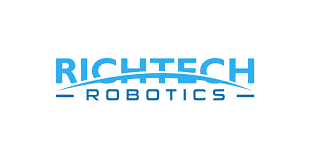Top 10 Trends in the Global Smart Robot Waiter Market: Key Companies, Market Growth and Demand
RELEASE DATE: Mar 2025 Author: Spherical Insights Request Free Sample
The Global Smart Robot Waiter Market is experiencing rapid growth as businesses in the hospitality and food service industries increasingly adopt automation to enhance efficiency and customer service. Smart robot waiters, equipped with AI, sensors, and autonomous navigation systems, are revolutionizing restaurant operations by improving order delivery, reducing labor costs, and providing seamless interactions with customers. The demand for robotic waiters is rising due to labor shortages, cost optimization, and advancements in artificial intelligence. Several key trends are shaping the future of this industry, influencing how restaurants and service providers integrate robotic solutions.
Top 10 Trends in the Global Smart Robot Waiter Market
1. Increasing Adoption of AI and Machine Learning in Smart Robots
Artificial intelligence (AI) and machine learning are playing a crucial role in the evolution of smart robot waiters. These technologies enable robots to process customer preferences, recognize voice commands, and improve navigation skills over time. Enhanced AI-driven capabilities allow robots to interact naturally with guests, offer personalized menu recommendations, and manage complex service requests. With advancements in deep learning, robotic waiters are now capable of understanding multiple languages, facial expressions, and even customer emotions, making dining experiences more engaging and efficient.
2. Expansion of Contactless Dining and Hygiene-Focused Solutions
The COVID-19 pandemic accelerated the demand for contactless dining, pushing restaurants to integrate smart robot waiters to minimize human interaction and reduce contamination risks. These robots ensure safe and hygienic food delivery, limiting direct contact between waitstaff and customers. Equipped with UV sterilization features, some robotic waiters also contribute to maintaining clean environments by disinfecting tables and serving areas. As consumer preferences continue shifting toward hygiene-conscious dining, restaurants are expected to expand investments in contactless service solutions.
3. Growth of Multi-Functional Robot Waiters
Smart robot waiters are evolving beyond basic food delivery to offer multi-functional capabilities such as taking orders, handling payments, and engaging in entertainment. Advanced robotic systems now feature touchscreens for self-ordering, voice recognition for menu guidance, and payment integration through QR codes and mobile wallets. Some robotic waiters are even programmed to perform greeting gestures, provide restaurant information, and offer interactive entertainment to customers. These expanded functionalities enhance customer engagement while streamlining restaurant operations.
4. Integration of Autonomous Navigation and Obstacle Avoidance
Navigation technology is a critical component of smart robot waiter efficiency. Robots equipped with LiDAR (Light Detection and Ranging), simultaneous localization and mapping (SLAM), and AI-powered sensors are improving pathfinding accuracy in dynamic environments. Advanced obstacle detection and avoidance systems allow robots to navigate busy restaurants, avoiding customers, tables, and furniture seamlessly. Enhanced real-time mapping capabilities ensure that robots can adjust their routes dynamically, improving service speed and reliability.
5. Rising Investments in Robotics and Automation in the Hospitality Industry
Global investment in robotics and automation is driving innovation in the smart robot waiter market. Major technology companies and robotics startups are investing heavily in AI-powered service robots, leading to continuous improvements in battery efficiency, motor functions, and machine learning algorithms. Governments and private investors are supporting automation initiatives in the hospitality sector to address labor shortages and rising operational costs. As robotics research advances, more cost-effective and scalable robotic solutions are expected to enter the market, making smart robot waiters more accessible to a broader range of businesses.
6. Development of Customizable and Brand-Specific Robot Designs
Customization is becoming a key trend in the smart robot waiter market, with businesses seeking brand-specific robotic designs to align with their themes and customer engagement strategies. Manufacturers are offering custom skins, voice modulation, and brand-specific AI interactions to enhance restaurant branding. Customizable robotic waiters allow businesses to differentiate themselves while providing a unique and immersive dining experience. From humanoid robots with expressive facial features to minimalist, functional designs, customization is shaping how restaurants integrate automation into their environments.
7. Expansion of Smart Robot Waiters in Hotels, Cafes, and Cruise Ships
While restaurants remain the primary adopters of smart robot waiters, their application is expanding into hotels, cafés, cruise ships, and airport lounges. Luxury hotels are deploying robotic concierge services to greet guests, deliver room service, and provide multilingual assistance. Cruise ships are integrating AI-powered robot bartenders and waiters to enhance guest experiences at sea. Cafés and casual dining chains are using smart robots to improve speed and efficiency in high-traffic service areas, ensuring fast and consistent order fulfillment. The expansion into new service industries is contributing to significant market growth.
8. Emergence of 5G-Enabled and Cloud-Connected Robots
Connectivity is becoming a major driver of innovation in smart robot waiters, with the integration of 5G networks and cloud-based AI systems. 5G connectivity enables real-time communication between robots, allowing for faster data processing, remote monitoring, and instant software updates. Cloud-connected robots can learn from shared data, improving decision-making and adapting to new restaurant environments without requiring extensive reprogramming. The adoption of IoT-enabled robotics is further enhancing restaurant automation by integrating robots with kitchen systems, order management platforms, and customer databases.
9. Cost Reduction and Improved Battery Life Enhancing Market Accessibility
Initial investment costs for smart robot waiters have traditionally been a barrier to widespread adoption. However, advancements in battery technology, production efficiency, and modular designs are leading to more affordable robotic solutions. Modern robots are now equipped with long-lasting lithium-ion batteries, fast-charging capabilities, and energy-efficient motors, allowing them to operate for extended hours without frequent recharging. The reduction in maintenance costs and enhanced durability is making smart robot waiters more viable for small and mid-sized restaurants, expanding their presence beyond high-end establishments.
10. Government Support and Regulations for Automation in Hospitality
Governments worldwide are recognizing the benefits of robotics in the service industry, offering incentives and funding to encourage adoption. Several countries are implementing policies to promote AI-driven automation, including tax incentives for businesses integrating smart robots. Regulations surrounding safety, cybersecurity, and human-robot interaction are also evolving to ensure seamless and ethical deployment of robotic waiters. Initiatives promoting AI-driven hospitality solutions are fostering a business environment where robotics play a central role in the future of dining and service industries.
List of Key Companies
- Telpo
- Lolly Ltd
- Richtech Robotics
- Keenon Robotics Co., Ltd.
- Service Robots
- Pudu Technology Inc.
- JnS Robotics
- Paaila Technology
- Quantum robotics
- Nuro
- Bear Robotics
- Others
Top 5 Company Profiles
1. Telpo

Headquarters: Xiamen, China
Telpo is a leading global provider of smart retail and service automation solutions, specializing in AI-powered self-service kiosks, payment terminals, and smart robot waiters. The company focuses on intelligent hardware development, integrating facial recognition, AI-driven interaction, and IoT connectivity to enhance customer experiences in the hospitality and food service industries. With a strong emphasis on cashless payment solutions and automated ordering systems, Telpo is a key player in the restaurant and retail automation market. Continuous investment in R&D and cloud-based AI technology has enabled Telpo to expand its presence across global markets, offering customized solutions for various business sectors.
2. Lolly Ltd

Headquarters: London, United Kingdom
Lolly Ltd is a UK-based company specializing in smart ordering and payment solutions for the hospitality industry. The company provides AI-powered self-service kiosks, digital ordering platforms, and automated payment systems, improving operational efficiency for restaurants, cafés, and quick-service outlets. Lolly Ltd focuses on integrating AI and cloud-based analytics to enhance customer engagement and streamline restaurant workflows. Its robotic waiter solutions complement its broader automation ecosystem, offering contactless dining experiences. With a commitment to digital transformation in food service, Lolly Ltd is expanding its footprint in Europe and beyond, supporting businesses in adapting to a technology-driven future.
3. Richtech Robotics

Headquarters: Las Vegas, Nevada, USA
Richtech Robotics is a pioneering company in AI-powered service robots, specializing in smart robot waiters, hospitality automation, and customer service robotics. The company’s robotic solutions are designed to improve efficiency in restaurants, hotels, and entertainment venues, offering seamless autonomous navigation, voice interaction, and multi-functional capabilities. Richtech Robotics emphasizes customizable robotic assistants, allowing businesses to integrate AI-driven service robots tailored to their specific needs. With a strong focus on AI innovation and machine learning, the company continues to develop next-generation robotic solutions that enhance operational efficiency and customer engagement in the service industry.
4. Keenon Robotics Co., Ltd.

Headquarters: Shanghai, China
Keenon Robotics Co., Ltd. is a global leader in autonomous service robots, providing smart robot waiters, hotel service robots, and delivery automation solutions. The company’s AI-powered robots utilize advanced navigation, obstacle avoidance, and real-time data processing to enhance efficiency in restaurants, healthcare, and retail sectors. Keenon Robotics collaborates with major hospitality brands and food service providers, integrating AI-driven customer service solutions to streamline operations. With rapid global expansion, Keenon Robotics is setting industry benchmarks in robotic automation, AI-driven interaction, and sustainable service robotics, driving the transformation of smart service industries worldwide.
5. Service Robots

Headquarters: Coventry, United Kingdom
Service Robots is a UK-based company specializing in AI-driven robotic automation for hospitality, healthcare, and entertainment industries. The company’s portfolio includes robotic waiters, AI-powered concierge robots, and interactive customer service assistants designed to enhance operational efficiency and customer engagement. Service Robots focuses on cutting-edge AI, speech recognition, and autonomous mobility, ensuring seamless integration of robotics into diverse business environments. With an emphasis on contactless service solutions and intelligent automation, the company is helping businesses adopt next-generation robotics for improved customer experiences. Its commitment to continuous innovation positions Service Robots as a key player in the evolving service robotics market.
Conclusion
The global smart robot waiter market is undergoing rapid advancements, driven by AI, automation, and contactless service trends. The increasing demand for hygiene-focused dining, personalized customer engagement, and operational efficiency is accelerating the adoption of robotic waiters in restaurants, hotels, and entertainment venues. As connectivity, AI capabilities, and affordability continue to improve, robotic waiters will play an even more significant role in transforming the hospitality industry. Businesses that embrace these emerging trends and invest in smart automation solutions are poised to gain a competitive edge in the evolving service landscape.
About the Spherical Insights & Consulting
Spherical Insights & Consulting is a market research and consulting firm which provides actionable market research study, quantitative forecasting and trends analysis provides forward-looking insight especially designed for decision makers and aids ROI.
Which is catering to different industry such as financial sectors, industrial sectors, government organizations, universities, non-profits and corporations. The company's mission is to work with businesses to achieve business objectives and maintain strategic improvements.
CONTACT US:
For More Information on Your Target Market, Please Contact Us Below:
Phone: +1 303 800 4326 (the U.S.)
Phone: +91 90289 24100 (APAC)
Email: inquiry@sphericalinsights.com, sales@sphericalinsights.com
Contact Us: https://www.sphericalinsights.com/contact-us